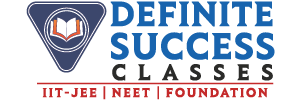
Balancing board exam preparation with JEE (Joint Entrance Examination) studies can be overwhelming for students. Both are crucial in shaping your future—board exams ensure you meet the minimum academic standards for higher education, while JEE is your gateway to prestigious engineering institutions like IITs and NITs. At Definite Success Classes, our expert mentors provide students with the tools and techniques to balance these two important milestones without sacrificing one for the other. In this blog, we will share five key ways to successfully manage your time and effort for both board exams and JEE preparation.
1. Create a Dual-Focused Timetable
Plan your preparation by creating a timetable for JEE and Board exams. This timetable should allocate time for both subjects tested in your boards as well as those critical for JEE.
How to Create an Effective Timetable:
- Board Exam Priority: Set aside dedicated hours for subjects like English or your optional language, which are important for boards but not directly related to JEE. Prioritize clearer concepts and thorough revisions.
- JEE Priority: Allocate time for both board-level studies and JEE-level problem-solving in Physics, Chemistry, and Mathematics. The NCERT books help build a solid foundation for both but practice tougher, JEE-specific problems to enhance your preparation.
- Weekly and Monthly Goals: For both board exams and JEE preparations, divide your syllabus into smaller parts to make the goals seem achievable
- Study Blocks: Implement focused study blocks where you prepare for boards in one session and switch to JEE topics in another.
2. Use NCERT as Your Base
The NCERT textbooks are your best friends when preparing for both boards and JEE. Since a significant portion of the JEE syllabus overlaps with board exams, focusing on NCERT books will help you excel in both.
Why NCERT is Crucial:
- Foundation for Boards: NCERT textbooks comprehensively cover the board exam syllabus, offering straightforward explanations of concepts commonly asked in the exams.
- Foundation for JEE: For JEE, especially in subjects like Physics and Chemistry, NCERT books provide the fundamental theories and concepts upon which advanced questions are based.
The key is to thoroughly understand every concept presented in NCERT books, especially the examples and exercises at the end of each chapter. After mastering the NCERT material, you can progress to tackling advanced problems for JEE.
3. Focus on Common Topics
A key element in successfully balancing board exams and JEE is efficient time management and prioritizing your mental well-being. By mastering these shared concepts, you can kill two birds with one stone—scoring well in both exams without duplicating effort.
How to Identify Common Topics:
- In subjects like Mathematics, topics such as Trigonometry, Calculus, and Algebra are common to both.
- In Physics, subjects like Mechanics, Thermodynamics, and Electromagnetism are covered extensively in both the board and JEE syllabi.
- Chemistry topics like Chemical Bonding, Organic Reactions, and Thermochemistry are essential for both exams.
4. Practice JEE Problems with a Focus on Board Exam-style Presentation
The presentation of answers plays a vital role in board exams, where clear and methodical steps are required. On the other hand, JEE is more about quick problem-solving and accuracy. To maintain a balance, students must practice JEE-level problems while keeping board exam presentations in mind.
Tips for Effective Practice:
- For Physics and Mathematics, solve JEE-level questions but also practice writing detailed steps, especially when dealing with derivations or numerical problems. This will prepare you for the long-answer format of board exams.
- For Chemistry, focus on theory revision for boards, while practicing JEE problems on numerical chemistry and organic reaction mechanisms.
- Mock Tests: Regularly attempt mock tests with a balance of both JEE and board-level questions to build your speed and accuracy for both exams.
5. Time Management and Stress Control
When you set specific time-based and achievable goals, even the biggest of goals seem easier. It’s obvious to feel overwhelmed with the pressure of both exams looming, but with the right strategies, you can keep stress at bay.
How to Manage Your Time and Stress:
- Time Management Techniques: Use techniques like the Pomodoro method, where you study for 25 minutes and take a 5-minute break. This helps avoid burnout and keeps your mind refreshed.
- Prioritize Weak Areas: Don’t try to study everything at once. Focus on your weak areas first for both exams and prioritize topics where you need more practice.
- Regular Breaks: Include short breaks between study sessions and make time for physical activities like a quick walk or light exercises. This boosts focus and reduces stress.
- Stay Positive: Positivity starts with believing in oneself. Remember that both exams are part of the journey, and with proper preparation, success is achievable.
Conclusion: Your Path to Success
Balancing your preparation for both board exams and JEE may seem challenging, but with the right strategies, it is entirely manageable. The key is to plan smartly, focus on common topics, and practice effectively. At Definite Success Classes, we are committed to helping students excel in both these important exams by offering expert guidance, a disciplined study plan, and comprehensive support.
If you’re looking for personalized coaching and expert mentorship to navigate the demanding preparation for both boards and JEE, join us at Definite Success Classes and take your first step toward success.
For more information, or to join our JEE and board exam preparation programs, contact Definite Success Classes today!

